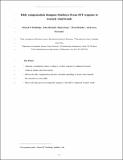Eddy Compensation Dampens Southern Ocean Sea Surface Temperature Response to Westerly Wind Trends
Author(s)
Doddridge, Edward W.; Marshall, John C.; Song, Hajoon; Kelley, Maxwell; Nazarenko, Larissa
DownloadSubmitted version (3.612Mb)
Open Access Policy
Open Access Policy
Creative Commons Attribution-Noncommercial-Share Alike
Terms of use
Metadata
Show full item recordAbstract
Anthropogenic influences have led to a strengthening and poleward shift of westerly winds over the Southern Ocean, especially during austral summer. We use observations, an idealized eddy-resolving ocean sea ice channel model, and a global coupled model to explore the Southern Ocean response to a step change in westerly winds. Previous work hypothesized a two time scale response for sea surface temperature. Initially, Ekman transport cools the surface before sustained upwelling causes warming on decadal time scales. The fast response is robust across our models and the observations: We find Ekman-driven cooling in the mixed layer, mixing-driven warming below the mixed layer, and a small upwelling-driven warming at the temperature inversion. The long-term response is inaccessible from observations. Neither of our models shows a persistent upwelling anomaly, or long-term, upwelling-driven subsurface warming. Mesoscale eddies act to oppose the anomalous wind-driven upwelling, through a process known as eddy compensation, thereby preventing long-term warming. ©2019
Date issued
2019-04Department
Massachusetts Institute of Technology. Department of Earth, Atmospheric, and Planetary SciencesJournal
Geophysical Research Letters
Publisher
American Geophysical Union (AGU)
Citation
Doddridge, Edward W., John Marshall, Hajoon Song, Maxwell Kelley, and Larissa Nazarenko, "Eddy Compensation Dampens Southern Ocean Sea Surface Temperature Response to Westerly Wind Trends." Geophysical Research Letters 46, 8 (April 2019): p. 4365-77 doi 10.1029/2019GL082758 ©2019 Author(s)
Version: Original manuscript
ISSN
0094-8276
1944-8007